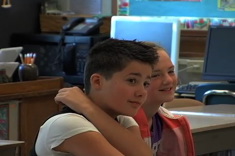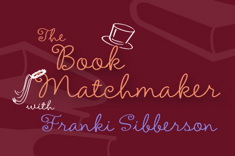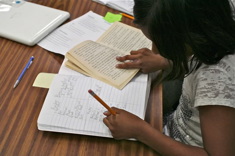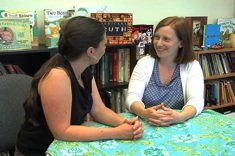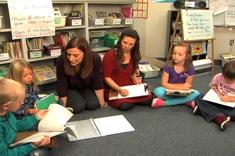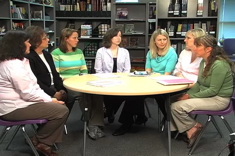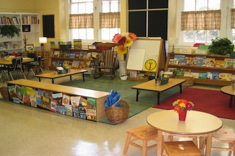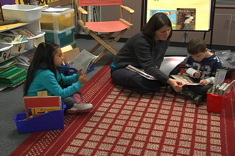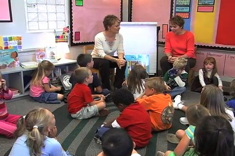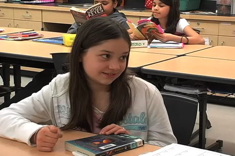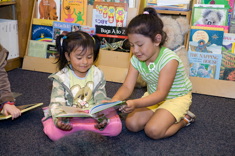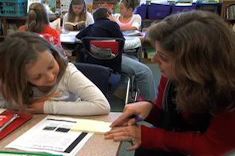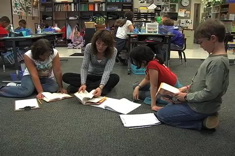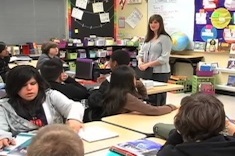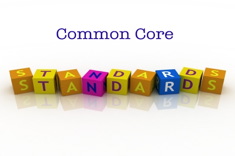Library
Choice Literacy Articles & Videos
The Choice Literacy library contains over 3,000 articles and 900 videos from 150+ contributors. Classic Classroom and Literacy Leadership subscribers have access to the entire library. Content is updated continuously, with five to six new features published each week.
Latest Content
Scaring Up Better Narratives Part I
Just before Halloween, Aimee Buckner leads a lesson on brainstorming topics in writer's notebooks using the mentor text Some Things Are Scary. In this first installment of a three-part series, Aimee reads the book and models her own thinking process and use of a writer's notebook.
Book Matchmaker: Teaching Theme in the Intermediate Grades
Students need strong mentor texts for understanding the concept of theme. Franki Sibberson shares many of her favorites in this Book Matchmaker.
The Sponge Summary Lesson Part 4
In this sequence of videos, Heather Rader teaches a 4th grade class, using the analogy of a sponge to explain how summaries work. In this fourth video, Heather and students discuss their summaries in progress
Using Video to Build the Home-School Connection
Video is a terrific tool for building connections between home and school. Heather Rader explains how Kelli Demonte uses video to guide children and communicate with families.
Stopping and Jotting
How can we be sure the writing tasks we ask of students are meaningful? Jennifer Jones looks at the issues of authenticity and control when it comes to assigning writing connected to reading in workshops.
Mentor Texts for Nonfiction Writing
Beth Lawson and Heather Rader meet to plan and share mentor texts for nonfiction writing in Beth’s fourth-grade classroom.
Scaring Up Better Narratives Part 2
Just in time for Halloween, Aimee Buckner leads a lesson on brainstorming topics in writer's notebooks using the mentor text Some Things Are Scary. In this second installment of a three-part series, Aimee continues to confer with students and helps everyone refine potential writing topics in their notebooks.
Listen In: Spelling Aids in the Writing Workshop
Many commercial aids are available to assist young writers. The challenge is choosing carefully, and integrating them into workshops in a way that doesn’t inhibit student fluency and risk-taking. In this video, Heather Rader confers with a second grader, demonstrating how to use a spelling log for high-frequency words.
Can I Quote You on That?: Capturing Classroom Conversation
Here's a fun notetaking strategy to try. Ellie Gilbert records snippets of conversation from Katie Doherty's students, and then uses them in a debrief session to discuss student strengths, needs, and next steps.
Teacher Language and Listening with Ellin Keene (PODCAST)
In this podcast, Ellin Keene shares her thinking about linking oral language and literacy development.
Why Read? – A Question to End the School Year
“Why read?” This is the question asked every spring in Erin Ocon’s middle school classroom, and in the process of answering it, she and her students rediscover a lot of what they’ve learned together throughout the year.
Voila! Best Writing and Entry Slips in Second Grade
The word voila in French literally means “see there.” Linda Karamatic puts time and reflection into creating a binder, or “voila book,” that will ease the bulging writing workshop folders and preserve the best of her second-grade students’ writing.
Second-Grade Team Meeting: Helping Students Choose Books Independently
In this five-minute excerpt from a second-grade team meeting, Principal Karen Szymusiak sits in on a discussion about the challenges of helping young readers learn to pick appropriate books independently.
A Seating Arrangement that Empowers: The Conversation Circle
Ann Marie Corgill explains why a circle arrangement for middle school reading and writing workshop share sessions is vital for helping students focus and respond thoughtfully to peers.
Unpacking the Common Core Standards: Compare and Contrast Nonfiction
Franki Sibberson highlights texts for teaching compare and contrast in nonfiction texts.
How Do We Know Small-Group Instruction is Effective?
Heather Rader considers how to assess the effectiveness of groups.
Scaring Up Better Narratives Part 3
Aimee Buckner leads a lesson on brainstorming topics in writer's notebooks using the mentor text Some Things Are Scary. In this final installment of a three-part series, Aimee continues to confer with students and shares a great tip for nonfiction research.
Grades K-2 Fluency Lesson
In this video from a K-2 multiage classroom, Joan Moser and Gail Boushey ("The Sisters") present a fluency lesson to the whole class.
Conferring with Tweens: Nastia
Katie Doherty confers with Nastia, a 6th grade English language learner who is working on her inferring skills.
Oral Language and Understanding with Ellin Keene (PODCAST)
In this podcast, Ellin Keene poses important questions to herself about true understanding and its relationship to language in the classroom.
Books that Make Kids Squeal
Shari Frost shares books with “squeal appeal” — here is a booklist of texts that energize and delight kindergarten learners.
Main Ideas, Summaries, and Notes in a Reading Conference
In this conference with a fourth grader, Aimee Buckner tackles text choice, notes, and main ideas all in less than five minutes. You’ll notice teachers observing in the background; the conference is part of a demonstration lesson sequence.
On Their Own (Almost): Coaching and Classroom Demonstrations Mid-Year
In this video filmed in mid-January, Jennifer Allen observes new teacher Jessica, and explains how she struggles to redefine her role in the classroom.
Launching a Book Club in 4th Grade
In this video from Andrea Smith’s 4th grade classroom, students get organized for a small group author study of Andrew Clements.
Evocative Coaching in Action (PODCAST)
In this podcast, Bob Tschannen-Moran uses the strategy of imaginative listening to process an unsettling interaction Heather Rader had with a colleague.
The Power of Games for 21st Century Learners
Franki Sibberson explains how low-tech board games can be a powerful tool for developing skills that will be in high demand in the coming years.
Lifting the Quality of Student Reading Letters with Quotes
Katie Doherty demonstrates for her middle school students how quotes can lift the quality of writing, using student and literary examples in this 11-minute video.
Book Matchmaker: Texts for an Advanced First Grader
Joan is a first-grade teacher who has one reader in mind – a student who is reading well above grade-level expectations. Franki Sibberson has many intriguing book suggestions to help her.
Common Core Conversations: Using Evidence From Text
Amanda Adrian and Heather Rader explain how the standard for finding evidence in texts might change instruction.
What Can You Learn from Slice of Life Writing?
Ruth Ayres inspires us to develop the habit of writing on a regular basis by taking a bite out of the Slice of Life Story Challenge.
Browse Content By
Type
Category
- Assessment Tools
- Big Fresh Archives
- Booklists
- Choice Numeracy
- Classroom Design
- Common Core
- Community Building
- Conferring
- Content Literacy
- Digital Literacy
- English Language Learners
- Equity
- Family Relations
- Free Samples
- Guiding Groups
- Leadership
- Literacy Coaches
- Mentor Texts
- Minilessons
- New Teacher Mentors
- Podcasts
- Poetry
- Quote Collections
- Reading Strategies
- Self Care
- Struggling and Striving Learners
- Talking and Listening
- Teacher Study Groups
- Teaching Reading
- Teaching Writing
- Word Study and Vocabulary
Author
- Melissa Quimby
- Nawal Qarooni
- Gwen Blumberg
- Julie Cox
- The Lead Learners
- Hannah Tills
- Josie Stewart
- Ruth Metcalfe
- Mallory Messenger
- Becca Burk
- Jodie Bailey
- Vivian Chen
- Mary Brower
- Tiffany Abbott Fuller
- Stephanie Affinito
- Ruth Ayres
- Leigh Anne Eck
- Heather Fisher
- Shari Frost
- Julie Johnson
- Suzy Kaback
- Gigi McAllister
- Shirl McPhillips
- Melanie Meehan
- Cathy Mere
- Debbie Miller
- Tara Barnett and Kate Mills
- Tammy Mulligan
- Dana Murphy
- Bitsy Parks
- David Pittman
- Brenda Power
- Heather Rader
- Matt Renwick
- Mandy Robek
- Christy Rush-Levine
- Gretchen Schroeder
- Jen Schwanke
- Brian Sepe
- Katherine Sokolowski
- Stella Villalba
- Jennifer Vincent
Grade Level
Choice Literacy Membership
Articles
Get full access to all Choice Literacy article content
Videos
Get full access to all Choice Literacy video content
Courses
Access Choice Literacy course curriculum and training

